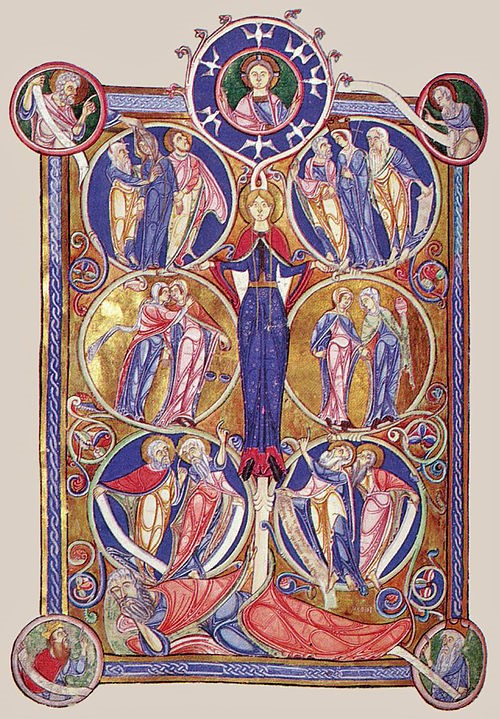Septuagintal Fullness
The Friday Reflection by James M. Kushiner
December 4th, 2020

O
n Friday, December 4, in Chicago, I harvested a few leeks. They're very late this year because I couldn't buy seedlings to plant and had to settle for planting a packet of old seeds in a raised bed.
After several weeks, I gave up on them, and transplanted in that bed a couple of stray cucumber vines. A couple of weeks later, I noticed tiny blades sprouting in the bed in straight rows—the old seeds had sprouted! I guess it was finally the fullness of time for those old leek seeds. I carefully removed the vines, fertilized and watered the bed.
After month or so, the seedlings were large enough to space out and fill the gaps in the thin green lines. After finishing, I counted the seedlings—about 70 or 72. I came in and told my wife that I we now had a Septuagint of leeks!
That was well into the heat of the summer, a full 6 weeks behind schedule. I waited for the septuagint to mature. Only in the last two weeks have any of the leeks been large enough to harvest. To date, the septuagint has been diminished by a dozen, while the Old Testament is upon us in Advent.
December 4 is the first day in December that does not commemorate an Old Testament saint. Looking ahead, I count 9 more days this month listed in the St. James Calendar that include Old Testament figures. The two Sundays before Christmas in the Orthodox Church commemorate dozens of Old Testament forbearers, more than a Jesse Tree can show.
"When the fullness of time had come, God sent forth his Son, born of woman, born under the law, to redeem those who were under the law, that we might receive adoption as sons." (Gal. 4:4-5) There is much to ponder, as the church has over the centuries, about this fullness of time and what preceded it—the Law, Prophets, and Psalms (quoted in the NT from the Greek Septuagint)—as well as who preceded it, including patriarchs, judges, and kings. "All these though commended through their faith, did not receive what was promised, since God had provided something better for us, that apart from us they should not be made perfect." (Heb. 11:39-40)
Note the shape of this perfection: those in the past are perfected when we are brought in. Like a seed and its mature plant, there is continuity from Old to New: The New doesn't abolish but fulfills the law and the Prophets. For the whole is in the seed. Those "old covenanter" seeds are matured in us as we are organically connected to them in Christ.
However, if today's "Christians," who stand in the line of the patriarchs and prophets (and apostles), dare to abolish and subvert the moral order incipient in the Old Testament and confirmed in the apostolic teachings by adopting modern secular notions, they disinherit themselves from the promises of Abraham and have no inheritance in Isaac and Jacob. They are another species, planted by the Lord's enemy. They openly reject their forbearers.
Abraham, Isaac, and Jacob; Sarah, Rebekah, and Ruth; Aaron, David, and Isaiah, are not perfected but rather betrayed or cut off by these modernizers who deny the doctrines of our fathers or "nuance" them into the opposite of what they originally meant, even "seducing my servants to practice sexual immorality" (Rev. 2:20). These are the tares in the wheat field planted by an enemy, examples of which can be found in the letters to the seven churches in Revelation.
In my bed of leeks, I had to battle weeds and remove them. In the wheat field of the world, it is the Lord's business to utterly remove them. In the meantime, per his instruction, we must take note of deceivers and follow apostolic prescriptions to protect the flock from the wolves, until the Lord's arrival on the scene, his Advent. We're forewarned. We can reap only what we sow.
Yours for Christ, Creed & Culture,

James M. Kushiner
Executive Director, The Fellowship of St. James
—James M. Kushiner is Executive Editor of Touchstone: A Journal of Mere Christianity, and Executive Director of The Fellowship of St. James.






